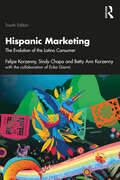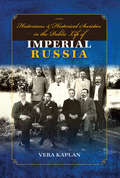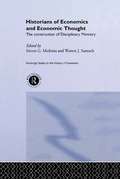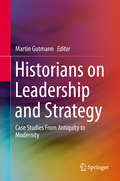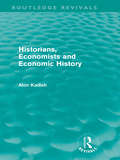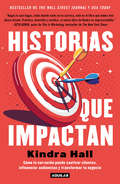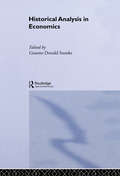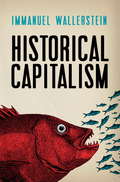- Table View
- List View
Hispanic Entrepreneurs in the 2000s: An Economic Profile and Policy Implications
by Alberto Dávila Marie T. MoraHispanics account for more than half the population growth in the United States over the last decade. With this surge has come a dramatic spike in the number of Hispanic-owned businesses. Hispanic Entrepreneurs in the 2000s is a pioneering study of this nascent demographic. Drawing on rich quantitative data, authors Alberto Dávila and Marie T. Mora examine key economic issues facing Hispanic entrepreneurs, such as access to financial capital and the adoption and vitality of digital technology. They analyze the varying effects that these factors have on subsets of the Hispanic community, such as Mexican Americans, Puerto Ricans, Cubans, and Salvadorans, while considering gender and immigrant status. This account highlights key policies to drive the success of Hispanic entrepreneurs, while drawing out strategies that entrepreneurs can use in order to cultivate their businesses. Far-reaching and nuanced, Hispanic Entrepreneurs in the 2000s is an important study of a population that is quickly becoming a vital component of American job creation.
Hispanic Market Power: America’s Business Growth Engine
by Isaac MizrahiThe US Hispanic segment represents the most prominent demographic growth in the country, and a huge and untapped business opportunity for companies willing to move away from preconceived notions and market effectively to Hispanic customers. This book shows you how. Now more than ever, corporations operating in the US should see the Hispanic population at the core of their existing and future strategies, but many leaders believe Hispanic marketing is the same marketing you run for Anglos but translated into Spanish, or that all Hispanics are undocumented immigrants with no purchasing power, or that using Mariachis in their communications is the way to connect with this diverse segment. It’s time for a modern approach, and in this book, Isaac Mizrahi, one of the country’s leading voices in multicultural marketing, uses his unique experience as a corporate executive, agency CEO, and industry leader to help businesses grow by leveraging the booming Hispanic consumer segment to drive sales. Filled with straightforward talk, illustrative case studies, and pragmatic suggestions and recommendations, this book counterbalances academic books on the topic with little connection to day-to-day reality and other books with a more political standpoint. This is a business book created by a marketer for other marketers and business leaders looking to succeed in the US.
Hispanic Marketing: The Evolution of the Latino Consumer
by Felipe Korzenny Sindy Chapa Betty Ann KorzennyHispanic Marketing: The Evolution of the Latino Consumer focuses on using cultural insights to connect with Hispanic consumers. This fourth edition brings up to date the theories, concepts, and practices that help readers understand Hispanic consumers and marketing communication campaigns across Hispanic segments.Written by leaders in the field of Hispanic marketing, this book uses theories of culture, acculturation, and social identification, among others, to explain Hispanic consumer reactions to products and advertising. It explores cross-cultural values and issues associated with branding, language, and acculturation, and provides the consumer insights required to understand, plan for, and respond to differences between Hispanic and non-Hispanic markets and across segmentation. Each chapter includes real-life case studies and distills the key implications for marketers, to ensure students grasp the essential concepts. This fourth edition includes: the introduction of marketing theories that have developed through studies on new and current topics in Hispanic consumer behavior; new topics such as bilingualism, artificial intelligence, cause-related marketing, boycotting behavior, and influencer marketing; 28 all-new case studies; updated figures and tables, including examples of advertisements and conceptual models; and instructor material, including an instructor manual, slide pack, and a test bank. This is important reading for undergraduate and postgraduate students studying Hispanic marketing and consumer behaviour specifically, as well as those interested in cross-cultural consumer behaviour and multicultural marketing. Support materials for this book are available at www.routledge.com/9781032137742.
Hispanic Marketing: The Power of the New Latino Consumer
by Felipe Korzenny Sindy Chapa Betty Ann Korzenny Liz VidalThis book is about strategic thinking in Hispanic marketing. The size and economic importance of the Hispanic market in the US are attracting enormous attention. The buying power of the US Hispanic market is now larger than the GDP of the entire country of Mexico, and it is the second largest Hispanic market in the world. Businesses and institutions have launched major initiatives to reach this important segment. Yet, the number of qualified individuals who understand the market is small; and many of those already catering to the market still struggle to learn about its intricacies. This book is a cultural approach to Hispanic marketing. Each of the chapters describes and explains the cultural principles of Latino marketing. Recent case studies help marketers relate to the material pragmatically. The book integrates concepts and practical examples and provides critical guidance to discern between alternative courses of action. This book is not about repeating well-known statistics, but about the Hispanic market as a cultural target. It takes a profound look at the values, beliefs, and emotions of US Hispanics, which impact consumer behaviour. Each of the chapters has been the subject of public presentations and lectures to marketing professionals. It is their positive reactions as well as the authorsOCO dedication to Hispanic consumers which motivated this book. Chapter 1: The Role of Culture in Cross-Cultural Marketing Chapter 2: Characteristics of the Hispanic Market Chapter 3: What Makes Hispanics OC HispanicOCO Chapter 4: The Role of Language in Hispanic Marketing Chapter 5: The Processes of Enculturation, Acculturation, and Assimilation Chapter 6 Cultural Dimensions and Archetypes Chapter 7: Culturally Informed Strategy Based on Grounded Research Chapter 8: US. Hispanic Media Environment and Strategy Chapter 9: The Evolution of Hispanic Marketing Chapter 10: The Future"
Hispanic Representation in the Department of Defense Civilian Workforce: Trend and Barrier Analysis
by Nelson Lim Kimberly Curry Hall Abigail Haddad Miriam Matthews Bruce R. Orvis ZavislanHispanics are less represented in the U.S. Department of Defense (DoD) civilian workforce than in the federal civilian workforce and the civilian labor force. This report assesses what factors might account for Hispanic underrepresentation in DoD. It includes assessments of trends in Hispanic employment and analyses of job applicant data. It also presents findings from interviews with representatives of DoD and of Hispanic-serving institutions.
Historia de la industria en la Argentina: De la Independencia a la crisis de 2001
by Claudio BeliniUn exhaustivo análisis de la historia de la industria en la Argentina desde inicios del siglo XIX hasta la crisis de 2001, que explica los motivos del carácter trunco del proceso de industrialización y examina las vinculaciones entre la industria, el contexto macroeconómico, el Estado y el empresariado. Historiográficamente exhaustiva y rigurosa, interpretativamente reflexiva y original, esta obra de Claudio Belini examina la compleja trama del proceso de industrialización argentino desde la Independencia hasta la crisis de 2001, y analiza los motivos de su fracaso. Desde el nacimiento de nuestro país, la imagen idealizada de una pujante industria nacional, asociada al anhelo de un desarrollo redentor, ocupó lugar central en el debate de la esfera pública. Sin embargo, la relación de la Argentina con su industria describió, históricamente, una trayectoria fluctuante, cuando no errática o directamente evasiva. Ya en el siglo XIX, de la mano del modelo agroexportador, el desarrollo industrial argentino sufrió sucesivas crisis y no logró consolidar un camino de crecimiento sostenido. Entrado el siglo XX, los intentos de industrialización orientados a la sustitución de importaciones modificaron la estructura de la economía e inauguraron una nueva etapa que prometía poner al país a la altura de las naciones más prósperas del planeta. Pero la Argentina se desvió muy pronto de ese sendero y, hacia mediados de la década del setenta se sumió en un período de estancamiento con consecuencias dramáticas. En palabras del autor: "...lo que intentamos presentar aquí es una historia económica y social de la industrialización en la Argentina que, sin la ingenua pretensión de ser una historia 'total', se propone contribuir a explicar nuestro pasado, así como a comprender sus repercusiones sobre el presente. [...] Si la historia es útil en algo -y creemos que lo es-, tal vez esta interpretación del progreso y declinación de la industria argentina aliente la discusión de ese pasado y de sus implicancias para el futuro del país."
Historia de un éxito: Las claves del triunfo de Juan Roig
by Javier Alfonso¿Cómo ha llegado el polémico y admirado Juan Roig a construir el imperio Mercadona? Un libro lleno de enseñanzas, experiencias y estrategias válidas para cualquier tipo de negocio en cualquier sector. «La semilla del fracaso está en el éxito. Si te lo crees, eres más destructible.» Juan Roig Juan Roig es un empresario excepcional que, partiendo de un modesto negocio familiar en Valencia, ha conseguido hacer crecer Mercadona de una forma imparable y plantando cara a sus competidores en un sector dominado por grandes empresas multinacionales. La cadena de supermercados ha sabido adaptar su estrategia a los profundos cambios del entorno con un modelo único de gestión que solo se puede entender conociendo la forma de pensar de Juan Roig, su carácter luchador y su obsesión por la mejora continua. Historia de un éxito: Mercadona no pretende ser un estudio teórico, sino una aproximación a la figura de Juan Roig, su entrada en la compañía y la introducción del modelo de gestión de calidad total que catapultó a la empresa al liderato. Javier Alfonso, profundo conocedor de la empresa, expone cómo Mercadona ha ido ajustando sus estrategias de precio y de producto a las circunstancias del mercado; describe su política distintiva con sus empleados que se basa en la máxima de Juan Roig: primero dar, luego pedir y después, exigir; y analiza la política de Mercadona con sus proveedores.
Historia del contrabando en la Argentina: De la aduana del virreinato a la mafia de los contenedores
by Mauro Federico Fernando Ortega ZabalaGenealogía de una actividad ilegal millonaria, varias veces superior al producto bruto interno, que involucró a los más altos funcionarios desde los orígenes hasta la actualidad del país. La patria nació bajo el signo del contrabando. Moreno, Belgrano, Brown y Rivadavia fueron de los primeros en desarrollar en el Río del Plata esta práctica que busca burlarse de aduanas y fronteras. Desde aquel momento inaugural, el contrabando se fue haciendo cada vez más complejo y se extendió al narcotráfico, a la trata de personas y al lavado de dinero. Algo que terminó asociándolo con la violencia y el crimen organizado. La Argentina tiene una larga historia de comercio ilegal en el que se mezclan multimillonarios negocios privados con la corrupción del Estado. En Historia del contrabando en la Argentina, Mauro Federico y Fernando Ortega Zabala realizan una documentada reconstrucción de la trama de este delito -con datos desconocidos hasta ahora-, en el que estuvieron y están involucrados altos personajes del poder, desde Menem a Macri. Este libro pone en evidencia que la ilegalidad sigue siendo parte ineludible del paisaje nacional.
Historians and Historical Societies in the Public Life of Imperial Russia
by Vera KaplanWhat was the role of historians and historical societies in the public life of imperial Russia? Focusing on the Society of Zealots of Russian Historical Education (1895–1918), Vera Kaplan analyzes the network of voluntary associations that existed in imperial Russia, showing how they interacted with state, public, and private bodies. Unlike most Russian voluntary associations of the late imperial period, the Zealots were conservative in their view of the world. Yet, like other history associations, the group conceived their educational mission broadly, engaging academic and amateur historians, supporting free public libraries, and widely disseminating the historical narrative embraced by the Society through periodicals. The Zealots were champions of voluntary association and admitted members without regard to social status, occupation, or gender. Kaplan’s study affirms the existence of a more substantial civil society in late imperial Russia and one that could endorse a modernist program without an oppositional liberal agenda.
Historians of Economics and Economic Thought: The Construction Of Disciplinary Memory (Routledge Studies In The History Of Economics Ser.)
by Steven G. Medema Warren J. SamuelsThe history of economic thought has always attracted some of the brightest minds in the discipline. These chroniclers of development have helped form our current views, and it is no surprise that many among them have been at the forefront of new movements in the history of ideas.This notable collection summarizes the work of these key historians of
Historians on Leadership and Strategy: Case Studies From Antiquity to Modernity
by Martin GutmannThis book examines the well-covered subject of leadership from a unique perspective: history's vast catalogue of leadership successes and failures. Through a collection of highly compelling case studies spanning two millennia, it looks beyond the classic leadership parable of men in military or political crises and shows that successful leadership cannot be reduced to simplistic formulae.Written by experts in the field and based on rigorous research, each case provides a rich and compelling account that is accessible to a wide audience, from students to managers. Rather than serving as a vehicle for advancing a particular theory of leadership, each case invites readers to reflect, debate and extract their own insights.
Historians, Economists, and Economic History (Routledge Revivals)
by Alon KadishFirst published in 1989, Alon Kadish’s study re-examines the standard view held by historians of economic thought whereby economic history emerged from the historicist criticism of neoclassical economic theory. He also demonstrates how the discipline evolved as an extension of the study of history. The study will appeal to students and scholars in historiography, the development of higher education and in the history if economic thought in general, as well as all those interested in the evolution of Oxford and Cambridge.
Historias de éxito
by Robert T. KiyosakiCon Sharon L. Lechter (CPA) ¡Entérese de cómo muchas personas han logrado el éxito financiero gracias a las lecciones del Padre Rico! "El futuro será brillante para los que se preparen desde hoy. Las personas que compartieron sus experiencias en este libro estudiaron a fondo las lecciones del Padre Rico pero, más importante aún, actuaron, aprendieron y obtuvieron experiencia, sabiduría y éxito financiero. Se hicieron responsables de su propia educación financiera y asumieron el control de su futuro financiero." Robert T. Kiyosaki "Gracias al Padre Rico, en 18 meses cambié mi salario por ingresos pasivos por más de 2000 dólares al mes, invirtiendo en bienes raíces." Thomas G. Kotula, St. Cloud, Minnesota HISTORIAS DE ÉXITO le revelará: Por qué no le servirán los pretextos clásicos de "no tengo dinero" o "no tengo tiempo". Por qué usted no es demasiado joven o demasiado viejo para emprender el viaje a la seguridad financiera y la independencia. Cómo superaron el miedo a invertir los inversionistas novatos. ¡Cómo obtener resultados financieros y éxitos similares! "Si tiene cincuenta años o más... le servirá la lección que el Padre Rico nos enseñó a mi esposo y a mí: compramos un negocio que nos proporciona flujo mensual de efectivo para mantenernos. Funcionó. Si nos funcionó a nosotros, seguro le funcionará a usted." Cecilia Morrison, Scottsdale, Arizona "Si sus inversiones han perdido valor, si ya está cansado de los viejos consejos financieros, si quiere retirarse en condiciones inmejorables, o si sólo quiere pasar más tiempo con la familia, usted puede encontrar algunas de las respuestas en las historias de éxito de las personas que pusieron en práctica las lecciones del Padre Rico y encontraron el camino al éxito financiero." Sharon L. Lechter
Historias de éxito
by Robert T. KiyosakiHistorias de las personas que estudiaron y siguieron las lecciones de Padre rico. De Robert T. Kiyosaki, autor de los bestsellers: Padre Rico, Padre Pobre, el libro #1 de finanzas personales de The New York Times por más de seis años; Niño rico, niño listo, Segunda oportunidad, entre otros. Experiencias verdaderas de personas que siguieron las lecciones del Padre Rico. "El futuro será brillante para los que se preparan desde hoy." Las personas que compartieron sus experiencias en este libro estudiaron a fondo las lecciones del Padre rico, pero más importante aún, actuaron, aprendieron y obtuvieron experiencia, sabiduría y éxito financiero; se hicieron responsables de su propia educación financiera y asumieron el control de su propio futuro financiero. Historias de éxito le revelará: -Por qué no le servirán los pretextos clásicos de "no tengo dinero" o "no tengo tiempo". -Por qué usted no es demasiado joven o demasiado viejo para emprender el viaje a la seguridad financiera y la independencia. -Cómo superaron el miedo a invertir los inversionistas novatos. -¡Cómo obtener resultados financieros y éxitos similares!
Historias que impactan: Cómo la narración puede cautivar clientes, influenciar audiencias y transformar
by Kindra HillEn el momento en que tomas el control de tus historias, tomas el control de tu negocio y de tu vida. "Hagas lo que hagas, estés donde estés en tu carrera, este es el libro que debes leer ahora mismo. Práctico, divertido y verídico, el nuevo libro de Kindra es imprescindible." -SETH GODIN, autor de This Is Marketing, bestseller de The New York Times Seguramente has escuchado que las historias son la mejor herramienta de negocios y que la narración de las mismas puede hacerlo todo, desde ayudar a los líderes a comunicarse mejor hasta motivar a los equipos de ventas y ganar clientes de la competencia. ¿Pero cuáles necesitas contar? ¿Y cómo hacerlo? En este libro, Kindra Hall, una reconocida narradora profesional y oradora, revela las cuatro historias únicas que puedes usar para diferenciar, cautivar y elevar: -La historia del valor: para convencer a los clientes de que necesitan lo que tú ofreces. -La historia de la fundación: para persuadir a los inversores y clientes de que vale la pena invertir en tu organización. -La historia del propósito: para alinear e inspirar a tus empleados y clientes internos. -La historia del consumidor: para permitir que aquellos que utilizan tu producto o servicio compartan tus experiencias auténticas con otros. Contarlas bien es una habilidad simple y accesible que cualquiera puede desarrollar. Con estudios de casos, perfiles de empresas y anécdotas respaldados por investigaciones, Kindra ofrece pasos específicos y accionables que puedes tomar para encontrar, crear y aprovechar las historias que ya tienes y que simplemente no estás contando.
Historic Bay Area Visionaries (American Chronicles)
by Robin ChapmanFor centuries, California's environment has nurtured remarkable people. Ohlone Lope Inigo found a way to protect his family in troubled times on the shores of San Francisco Bay. Pioneer Juana Briones made a fortune from her rancho yet took the time to care for those in need. Innovator Thomas Foon Chew discovered a climate for success, in spite of the obstacles. Around the region that became Silicon Valley, filmmaker Charlie Chaplin found inspiration, poet Robert Louis Stevenson uncovered adventure and Sarah Winchester built a house that would intrigue people long after she was gone. Author Robin Chapman shares fascinating tales of those who exemplify the enterprising spirit of the Golden State.
Historic Philadelphia: An Illustrated History
by James SmartHistoric Philadelphia: An Illustrated History by James Smart
Historic Racial Exclusion and Subnational Socio-economic Outcomes in Colombia: Equal but Different (Latin American Political Economy)
by Irina España-EljaiekThis book examines the geo-racialized order of the Colombian state and its consequences for Afro-descendant territories. To do so, it employs a historical institutional approach tracing racial exclusion and subnational socioeconomic outcomes in Colombia during the late nineteenth to mid-twentieth centuries. It uses a mixed-methods and interdisciplinary qualitative and quantitative analytical approach to identify the quantitative effects of informal racial exclusion on subnational collective outcomes, as well as to show more precisely how these effects were generated. Through its exploration of Colombia’s geo-racialized project, implicit exclusion of Afro-descendant territories and spatialized nature of racial diversity, this book contributes to literatures of Latin American political economy, institutional theory, racial politics and economic history.
Historic Sears, Roebuck and Co. Catalog Plant
by John Oharenko Homan Arthington FoundationLocated on the site of the original Sears Tower, the historic Sears, Roebuck and Company catalog plant is one of the nation's most unique landmarks. Representing American ingenuity at its best, Richard Sears and Julius Rosenwald combined technology, commerce, and social science with bricks and mortar to build "the World's Largest Store" on Chicago's West Side. Completed in 1906, the plant housed nearly every conceivable product of the time: clothing, jewelry, furniture, appliances, tools, and more. The complex employed 20,000 people, and merchandise orders were processed and delivered by rail--within the same day. During the first two decades of the 20th century, almost half of America's families shopped the over 300 million catalogs published in that era. WLS (World's Largest Store) Radio broadcasted the Gene Autrey show from the top of the tower, and the first Sears retail store opened here on Homan Avenue and Arthington Street. In 1974, Sears moved to the current Sears Tower. Thanks to many individuals who fought to save these architecturally and historically important treasures, the administration building, the original Sears Tower, the catalog press-laboratory building, and the powerhouse remain today. There are currently plans for redeveloping these buildings into housing, office, and retail space. A new Homan Square Community Center stands on the site of the merchandise building.
Historical Analysis in Economics
by Graeme Donald SnooksNeo-classical economics is frequently criticised for paying inadequate attention to historical processes. However, it has proved easier to make broad claims that `history matters' than to theorise with any depth about the appropriate role for history in economic analysis. Historical Analysis in Economics considers what history can contribute to the science of economics: how would it matter if `history mattered?'
Historical Archaeologies of Capitalism
by Mark P. Leone Jocelyn E. KnaufThis new edition of Historical Archaeologies of Capitalism shows where the study of capitalism leads archaeologists, scholars and activists. Essays cover a range of geographic, colonial and racist contexts around the Atlantic basin: Latin America and the Caribbean, North America, the North Atlantic, Europe and Africa. Here historical archaeologists use current capitalist theory to show the results of creating social classes, employing racism and beginning and expanding the global processes of resource exploitation. Scholars in this volume also do not avoid the present condition of people, discussing the lasting effects of capitalism's methods, resistance to them, their archaeology and their point to us now. Chapters interpret capitalism in the past, the processes that make capitalist expansion possible, and the worldwide sale and reduction of people. Authors discuss how to record and interpret these. This book continues a global historical archaeology, one that is engaged with other disciplines, peoples and suppressed political and economic histories. Authors in this volume describe how new identities are created, reshaped and made to appear natural. Chapters in this second edition also continue to address why historical archaeologists study capitalism and the relevance of this work, expanding on one of the important contributions of historical archaeologies of capitalism: critical archaeology.
Historical Capitalism
by Immanuel WallersteinA succinct introduction to the history of capitalism by the renowned political theorist. In this short, highly readable book, the master of world-systems theory provides a succinct anatomy of capitalism over the past five hundred years. Considering the way capitalism has changed and evolved over the centuries, and what has remained constant, he outlines its chief characteristics. In particular, he looks at the emergence and development of a world market, and of labor; in doing so, he argues that capitalism has brought about immiseration in the Global South. As long as they remain within a framework of world capitalism, Wallerstein concludes, the economic and social problems of developing countries will remain unresolved.Historical Capitalism, published here with its companion essay Capitalist Civilization, is a concise, compelling beginners' guide to one of the most challenging and influential assessments of capitalism as a world-historic mode of production.
Historical Dictionary of the 1940s
by James Gilbert Ryan Leonard C SchlupThe only available historical dictionary devoted exclusively to the 1940s, this book offers readers a ready-reference portrait of one of the twentieth century's most tumultuous decades. In nearly 600 concise entries, the volume quickly defines a historical figure, institution, or event, and then points readers to three sources that treat the subject in depth. In selecting topics for inclusion, the editors and authors offer a representative slice of life as contemporaneous Americans saw it - with coverage of people; movements; court cases; and economic, social, cultural, political, military, and technological changes. The book focuses chiefly on the United States, but places American lives and events firmly within a global context.
Historical Epistemology of Ecological Economics: Essays on the Styles of Economic Reasoning (Contributions to Economics)
by Alberto FragioThis volume uses historical epistemology in order to address several topics in the history of economic thought, with special emphasis on ecological economics, environmental metaphors of scarcity, and mathematical ecology. Using the field of ecological economics as an anchor point, the author reflects on the styles of reasoning in economics with a view towards understanding the nature of disagreement that stems from a failure of communication between rival approaches in economics. A thorough inquiry into issues related to identity, coherence, pluralism, and reception, this volume will appeal to researchers and students interested in history of economic thought, ecological economics, and philosophy of the sciences.



